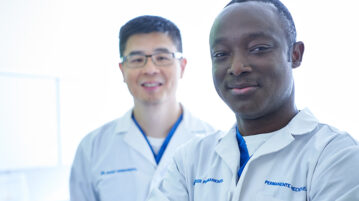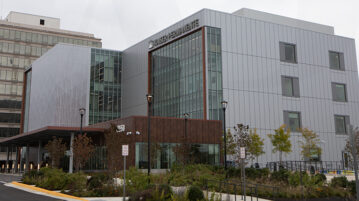By Anna Childson, MD
A nutritious, well-balanced diet is essential to maintaining good health at any stage of life, but it becomes especially important when you’re expecting a baby.
How much to eat
One of the biggest misconceptions about pregnant women is the cliché advice, “You’re eating for two.” You are indeed eating to feed you and your baby, but your energy requirements will not double. In fact, doubling your food intake will likely cause you to gain more weight than necessary, which can put your pregnancy at risk for complications.
During the first trimester, most women do not need to consume any additional calories. During the second and third trimesters, it’s recommended you consume an additional 300 calories per day. That’s the equivalent of another small meal or half a sandwich.
In general, if you were at a healthy weight before you got pregnant, you should gain a total of 25 to 35 pounds. Overweight women should gain less than that, but shouldn’t lose weight. To find out specifically how much you should gain, talk to your doctor or use the United States Department of Agriculture’s pregnancy weight gain calculator.
How much of what to eat
Eating well should begin before you even get pregnant. A good way to make sure you have a balanced diet is to use the USDA’s MyPlate model:
- One-half of your plate should be filled with fruits and vegetables. Bonus points for eating those that contain both vitamin A, essential for healthy fetal development, and potassium (vitamin K), which helps mothers maintain fluids and electrolytes. A few good options include sweet potatoes, carrots, pumpkin, cooked greens, spinach, and tomatoes.
- One-quarter of your plate should contain lean proteins, such as lean meats, fish, eggs, beans, tofu, and nuts and seeds.
- One-quarter of your plate should contain grains, such as breads, grits, and pasta, and at least half of these should be whole or enriched grains: brown rather than white rice, whole-grain breads and pasta, quinoa, fortified hot and cold cereals, popcorn.
- The MyPlate graphic also features a glass of milk near the plate, symbolizing dairy products that can help you get enough calcium, which is important for your baby’s developing bones. Stick to non- or low-fat milk, soymilk, and yogurt, and make sure these are fortified with vitamins A and D.
Also limit your intake of saturated fats, found in cheeses, fatty meats, whole milk, desserts, and fried foods. Use vegetable oils instead of butter when you can. Avocados, olives, and nuts are healthy sources of fat.
Foods to focus on
Some foods are especially good to eat during pregnancy. Berries are chock-full of vitamins and a great source of fiber. Cooked fish is an excellent source of protein while also providing omega-3 fatty acids, which are crucial to your baby’s brain development. (However, there are some types of seafood to avoid; see “Food to avoid” below.)
Of all the necessary nutrients during pregnancy, folic acid, or folate, might be most important. It’s critical to the development of the baby’s central nervous system and helps prevent birth defects. Foods rich in folic acid include dark green vegetables such as spinach and kale, citrus fruits including orange juice, and beans, pasta, and rice.
You’ll also need about twice as much iron as usual to prevent anemia in you and your baby. Iron-rich foods include lean meats and poultry, as well as fortified cereals and raisins. Beans and legumes also provide iron, as well as being cholesterol-free protein sources.
Foods to avoid
There are some foods pregnant women should avoid:
Fish or seafood high in mercury: swordfish, shark, king mackerel and tilefish. Limit canned white tuna to six ounces per week.
Raw or undercooked fish and shellfish: These can contain harmful viruses and bacteria, and include oysters, scallops, and clams, as well as sushi and sashimi.
Undercooked poultry, meat, or eggs: Any raw or undercooked animal product increases your risk for illnesses caused by bacteria such as listeria, which can harm your baby’s development. Deli meats and hotdogs are a common source of listeria and must be fully cooked until they are steaming hot (or avoided entirely).
Food that contains unpasteurized milk: Soft cheeses such as blue, brie, and feta may contain unpasteurized milk; be sure to read the label. These can also cause listeriosis.
Unwashed produce: Fruits and vegetables must be washed thoroughly to eliminate bacteria and prevent food poisoning.
Caffeine: Up to 200 milligrams a day is okay, but it’s best to limit caffeine intake beyond that. An 8-ounce cup of coffee contains 95 milligrams; a 12-ounce cola contains 33 milligrams.
Take a supplement
Even if you follow these guidelines to the letter, you might fall short on certain nutrients. Taking a prenatal supplement can help ensure you get all the vitamins needed during pregnancy. These supplements also typically contain calcium, folic acid, and iron. But remember, supplements are no substitute for eating healthy food; they just fill in the gaps in your diet.
Of course, be sure to discuss your specific nutritional needs with your obstetrician or primary care doctor. Eating well is one of the best things you can do for baby, and for yourself. Bon appetit!
For more information about remaining healthy throughout your pregnancy, visit MAPMG’s Staying Healthy pages.
Anna Childson, MD, is a board-certified obstetrician and gynecologist with the Mid-Atlantic Permanente Medical Group. She sees patients at the Kaiser Permanente Falls Church Medical Center.




